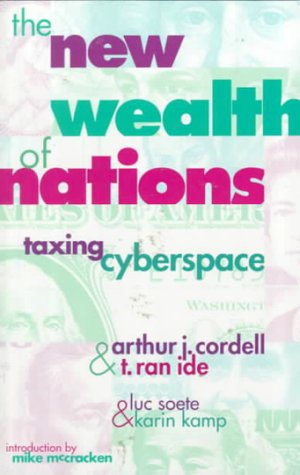Your cart is currently empty!
The New Wealth of Nations: Taxing Cyberspace
Between The Lines, Toronto, 1997.
ISBN 1-89637-10-5
The new wealth of Nations: Distributing Prosperity

A paradox has caught the attention of developed nations. It has to do with the dramatic growth of the globalized, information- based New Economy. While highly productive, the rewards are not widely distributed. Rewarding few, it downsizes many. Oozing wealth at the high end, the New Economy seems unable to distribute prosperity to those in the middle or at the low end.
With downsizing and outsourcing of jobs, there are fewer workers paying taxes and more on the unemployment rolls. The tax base shrinks and income support claims rise.
In nations with falling tax dollars, the physical, educational and social infrastructure declines. Universality in health, education, libraries–even access to clean water–is questioned as government tax revenues decline, as the budget deficit takes centre stage.
Over two hundred years ago, Adam Smith wrote his famous book: The Wealth of Nations. For Smith, wealth was based on the division of labour and the extent of the market. Today we can add to society’s production function: knowledge, information and
communications.
The new wealth of nations is found in the trillions of digital bits of information pulsing through global networks. These are the physical/electronic manifestations of the many transactions, conversations, voice and video messages and programs that, taken together record the process of production, distribution and consumption in the new economy.
What happens to the productivity gains created by global digital networks? Some show up in profits, some in lowered prices, some go to domestic labour and some to domestic or off-shore capital.
While part of the increased productivity shows up in earnings to firms adopting the technology, to banks, to telecom firms or other network operators, it appears that some of the productivity gains just disappear. It is either a non-monetary item (eg., time saved in using ATMs for banking) or the productivity is diffused over so many domestic and foreign players that it is not appropriated effectively, if at all. If all productivity gains were accurately reflected in our national accounts, some economists conclude that growth rates would be as much as a full percentage point higher.
The challenge is to fully access the new productivity. One approach is to “follow the money.” Go to where the new wealth is being created.
While there are few kudos for proposing a new tax, the move to a new economy should be matched by consideration of a new tax base. A tax base that is growing, can be easily identified and where collection is in few hands. A tax that is difficult to avoid.
How do we it? Imagine a turnover tax on digital traffic. It is similar to a gasoline tax, paying a toll on a bridge or highway or paying vehicle license fees. These excise and indirect taxes are by weight of vehicle, or amount of gas used, not on the value of the commodity carried. So why not tax the digital traffic on the Information Highway? Whether the digital bit is part of a foreign exchange transaction, or a business teleconference, check clearance information, or an ATM transaction, each bit is a physical manifestation of the new economy at work.
So let’s imagine a ‘bit tax.’ Automatically metered, it will cause fewer collection problems than most other direct or indirect taxes. Collected by the telecom carriers, satellite networks and cable systems, revenues would flow directly to the revenue service
of the respective country.
Research has to be done on the burden or incidence of this new tax. Is it progressive or regressive? Will it be absorbed by the carriers or passed on to consumers? Should lower rates apply to some heavy traffic items such as digital movies downloaded to the home? Can one nation bring in a bit tax or does it require international collaboration?
The point is to begin a discussion on the sort of new taxes appropriate for a new economy.
A bit tax can lead to the monetization of all productivity. One result: economic growth numbers will more accurately reflect the productivity advances brought by information technologies. And this new growth is likely to be non-inflationary since so much productivity has been unaccounted for.
With monetization will come higher gross domestic product and higher revenues to be used in a variety of ways.
New revenues can be used for schools, parks, health care, to re-train some for new jobs and, for those who cannot be retrained to provide a continuing flow of income that allows displaced workers to maintain their dignity–and purchasing power–in the new economy. This last point is important since purchasing power is needed to maintain effective demand in our economies if we are to avoid chronic economic recessions or worse.
The bit tax may be one way to more fully distribute the benefits of the New Economy. One way for the productive power of information technology to bring with it a New Wealth of Nations.
